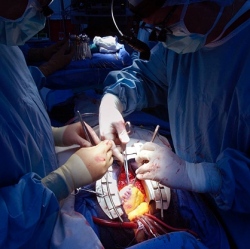
Regenerative medicine researchers at Wake Forest Baptist Medical Center in North Carolina have developed what they say is the most successful method to date to keep blood vessels in new human-sized pig kidney organs open and flowing with blood, a major challenge in the quest to build replacement kidneys in the lab.
“Until now, lab-built kidneys have been rodent-sized and have functioned for only one or two hours after transplantation because blood clots developed,” said Anthony Atala, M.D., director and professor at the Wake Forest Institute for Regenerative Medicine and a senior author on the study.
“In our proof-of-concept study, the [blood] vessels in a human-sized pig kidney remained open during a four-hour testing period. We are now conducting a longer-term study to determine how long flow can be maintained.”
If proven successful, the new method to more effectively coat the blood vessels with endothelial cells (which line the interior surface of blood vessels) could potentially be applied to other complex organs that scientists are working to engineer, including the liver and pancreas, the researchers say.
